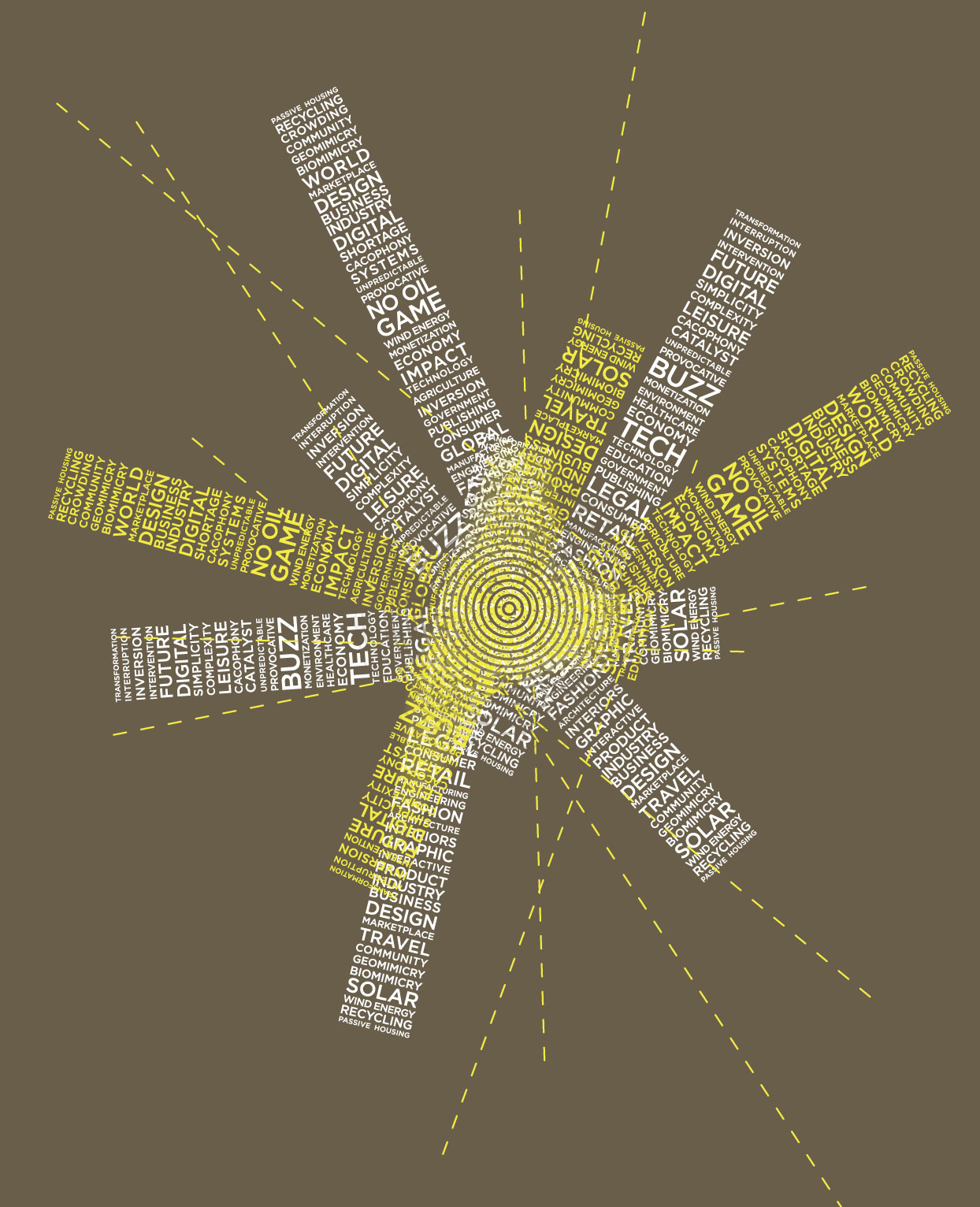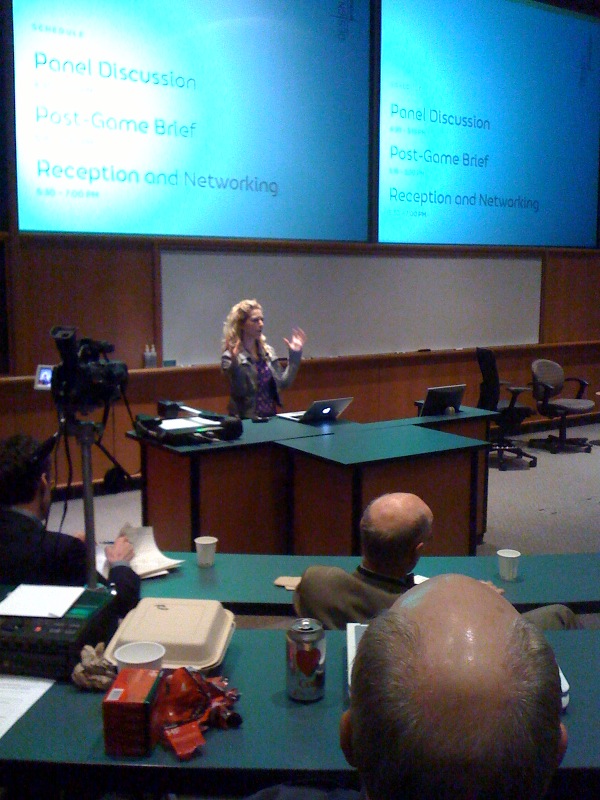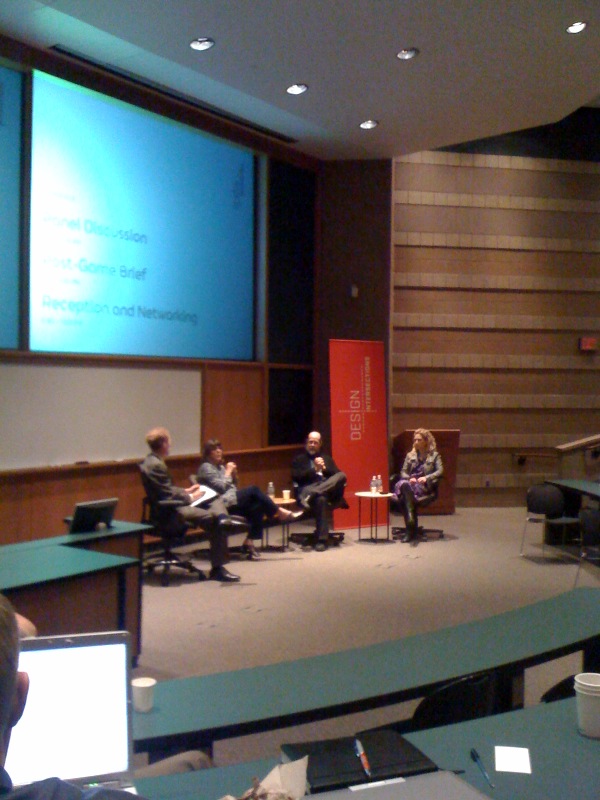Saving the World One Gamer at a Time
Camille LeFevre reports back from a recent conference at the U of MN, the first in a proposed series called "Design Intersections." The symposium focused on crowdsourcing solutions for some of the world's most pressing problems through online gaming.



A COUPLE OF WEEKS AGO, I WAS AMONG 150 “Super-Empowered Hopeful Individuals” who, in about 25 minutes, generated 527 solutions to thriving in a world without oil. Woot! It was an “Epic Win,” said Jane McGonigal Ph.D., “an amazing gift to the world.” The charismatic game designer guided us in playing her online alternate-reality project, World Without Oil, during the College of Design conference “Disruptive Effects: How Design is Changing Your World (and how to profit from it).” The conference, which took place at the Carlson School of Management at the U of MN, was the first in a proposed annual series titled Design Intersections.
As McGonigal explained during the pre-game warm-up (an inspiring talk, “Epic Win: How Games Can Help Us Solve the World’s Biggest Problems”), an Epic Win (she’s big on capital letters) is an outcome so positive we can’t even conceive it as possible. “We’re in an underdog position,” she explained, citing the conditions facing a world in which poverty, hunger, war, economics, oil dependency, global warming, and compromised human rights immediately threaten our existence. She sums up simply, “We have wicked problems, and we need an Epic Win.”
For McGonigal, such a victory requires harnessing the time, energy, and creativity of the 500 million gamers around the world, who collectively spend three billion hours weekly playing online social network (not video) games, to solve the world’s most pressing problems. Contrary to popular belief, gamers are not depressed, socially isolated misfits, McGonigal said. According to her research, gamers possess four remarkable “super powers.” They’re “urgently optimistic,” persistent in striving to reach ever increasing degrees of accomplishment, just beyond their current level of ability. Gamers are intertwined in a unique social fabric, as they share the values and goals of the community in which they’re creatively solving problems.
They engage in “blissful productivity” as they flow through and creatively succeed at ever-more difficult tasks (she cited the popular Facebook game, Farmville, as an example). And, in the course of the game, players may experience a sense of “epic meaning” that stems from attachment to something bigger themselves — the same sense of significance usually associated with participation in art, politics, or religion. (Even pure adventure games like World of Warcraft, McGonigal argued, provide players with help, direction, and opportunities to “save the world.”) These four superpowers add up to what she called “Super-Empowered Hopeful Individuals” (a term coined in response to Thomas Friedman’s pithy moniker for terrorists, Super-Empowered Angry Individuals); McGonigal describes SEHI’s as “people empowered by network technology.”
______________________________________________________
“We’re in an underdog position,” McGonigal explained, citing widespread poverty, hunger, war, economics, oil dependency, global warming, and compromised human rights. “We have wicked problems, and we need an Epic Win.”
______________________________________________________
The trick, then, is translating and transporting the gaming skills honed in virtual worlds toward coming up with creative solutions for real-world problems. (During an open discussion later, McGonigal wryly pointed out that there’s more cooperation in the online world than in the current Congress: “Maybe we need a new game that reinvents democracy.”) As the conference attendees clustered into smaller groups to play McGonigal’s 2007 game World Without Oil, there was no denying the energy in the room. Deploying each other’s strengths and expertise (revealed during an earlier exercise), we rapidly cruised through the alphabet, logging in problems and solutions.
After we finished the game, and while McGonigal’s colleagues at the Institute for the Future in Palto Alto crunched our results, we heard from Tom Erickson, an interaction designer at the IBM T.J. Watson Research Center in New York; he spoke on innovations in harnessing social intelligence to develop design strategies for creating smarter cities that use fewer natural resources. In her talk, Nora Paul, director of the Institute for New Media Studies at the U of MN, emphasized the need for news organizations to become more innovative and experimental in telling stories on the web, specifically by publishing more interactive, visual, and audio narratives.
And then we were back to McGonigal, who presented us with the top 15 World Without Oil solutions we’d collectively come up with. These included strategies for effective emergency services without oil (an exhaustive entry, she said, that delved into developing on-site fire fighting, networks of first responders, and a smartphone app for 911), and improving vision without oil (a healthcare model in which laser surgery would become the norm, eliminating the plastics necessary for glasses and contact lenses).
Throughout the day, thinkers from Thomas Friedman to Malcolm Gladwell, and Marshall McLuhan to Daniel Pink were invoked (the usual suspects at a design conference). Moderator Tom Fisher, dean of the College of Design, even went so far as to insist that we’re not in a cyclical recession. Rather, he claimed we’re simply at the close of the era which started with the printing press. “We’re at the end of the Gutenberg revolution,” Fisher said, “and in [the midst of] another revolution, one that’s digital and is transforming culture, the everyday, business,” and all other aspects of life across the globe just as thoroughly and inevitably as did the advent of moveable type.
It’s a revolution that’s marked by creativity, by interaction. And it’s imperative that all of us — whether we’re gamers or not — find some level of engagement on which to ride the wave. Once engaged, we could, each of us, contribute our individual expertise to solving the world’s most pressing crises.
At the end of the conference, Fisher asked what the next big disruptions might be, to which McGonigal replied, “Everything’s disrupted already. … There have been radical disruptions in our ideas of quality of life and happiness, which have shown that those ideals aren’t sustainable. We need new ways to produce happiness with finite resources and to feel rewarded, motivated, and connected with people. We need an economy built on making people sustainably happy.”
Whether or not gaming is the way, the ideas presented by McGonigal and others were provocative, enlightening, and energizing. I may not be ready quite yet to devote my precious hours to learning how to solve problems in a virtual world (especially with summer coming on), but I certainly left the conference feeling like a newly-minted, Super-Empowered Hopeful Individual.
______________________________________________________
About the author: Camille LeFevre is an arts journalist and college professor.